Josh York, Owner of Soft Goods and US Manufacturer Joins The Herd Has Spoken Podcast
Josh York -- Owner of Soft Goods and US Manufacturer
Josh York joins The Herd Has Spoken to chat with Brad about the realities of USA manufacturing and how his American clothing manufacturer, Soft Goods is competing in a global marketplace all from his hometown of Detroit. Josh is proud to source American-made materials locally, and the majority of his team lives within the city of Detroit. As an emerging entrepreneur who works tirelessly to improve the well-being of others through his business ventures, we are grateful to have him as a member of the MuskOx Herd, and grateful to have Soft Goods manufacture the 100% made in America Holden Crew.
Apple Podcasts | Anchor.fm | Breaker | Google Podcasts | Spotify | YouTube
Enjoy the conversation between Josh and Brad
Brad
Josh, thanks for joining us here on The Herd Has Spoken.
Yeah, thanks for having me. I'm excited to get into it with you.
Brad
Absolutely. So let's just dive right in Soft Goods. Why is it that you're trying to compete in a global marketplace that's really challenging, and is dealing with tons of international companies in terms of creating and manufacturing apparel with a startup emerging brand, in your hometown of Detroit, Michigan.
Josh
That is quite an opening question. Just as many reasons, but I grew up in Metro Detroit. And always it was always my ambition to create something in Detroit and build a business here that can serve as a means to employ people in Detroit. And at a young age, I had a passion for apparel and used to make iron on T-shirts in my kitchen with my mom and sell them at school in high school. And that ultimately led me to getting a job at Abercrombie and Fitch after college as a production manager. So I had kind of everything under the sun in terms of experience, and literally making things myself to big fashion in the corporate world. And I saw an opportunity. And I still think it's a huge opportunity. There's a kind of a shift that garment manufacturing automation is catching up in our world. And garment manufacturing is slowly shifting away from China to lower cost countries and other places. But at the same time, transportation costs continue to increase and you know, the market moves faster and people need stuff now and not in six months when it can get delivered from Asia. And I think there's a really unique opportunity that's going to start arising as technology catches up, the costs are going to come down to manufacture things in the US and it matches, you know, as the market moves to I think there's a really unique opportunity to make really great, great clothing in a faster timeline than traditional and do it in a way that can also benefit the community, which is kind of right where we're trying to go. So again, making premium stuff that we think is actually better than what you're able to get overseas a lot of times making it faster. And we're also trying to make it easier.
Brad
After the street where Soft Goods is, is located, but I think it's interesting to see that there is definitely a marketplace for this. But at the same time, most of these big fashion brands have all of their manufacturing done overseas. So how is it that you think that us factories can compete with facilities around the globe?
Josh
For me, I worked way, way more hours before I met my girlfriend a year ago. She's been good for me to force me to not even force me I want to, but just give me something else to do on the weekends and go up north to her parents house. And, you know, give me reasons to do things outside of work instead of working seven days a week, 10 hours a day. And I'm glad I did that for a few years. That's what needed to happen to get where we are now. But um, I guess just, I'm really focusing on like, when I go on those weekend vacations, like actually not working and actually separating the two and it is tough. I'm not great at it. But I'm working on it. I think. So I think in talking I've realized that the important thing is just being conscious of it and being aware of it and addressing it and being proactive to address it. I love that the diagnosis is the cure, excuse me, the cure is the diagnosis in some ways there. So I think that's pretty powerful stuff. Well, I'd love to take a step back. So you've you've made the choice to not, you know, pursue venture capital investment in any of your businesses, to the extent of, of my knowledge here is that let me pause and make sure that's correct. That's correct. For the time being, we've had some interesting conversations, and it's definitely something that we're interested in. If it makes sense with the right partner in the future. It's more of an interest now than it's been in a while. I love it. Okay, perfect. So from, from your perspective, what role do you believe venture capital has in startup businesses, and I think yeah, I think we've been really fortunate that we've made a ton of mistakes when we are still really young and when we had very few people and we maybe wasted a lot of money in terms of where we're at now but in the scheme of things like we're going to be so much better off when we are double the size or triple the size and we've worked through a lot of those
Well, who I'm sure we'll get to, we'll join the team full time here in a month who has a really strong specialty in e-commerce and we're trying to make what we're calling direct to consumer manufacturing. So Brad, have you started a clothing brand, what have you done, and you need to find a manufacturer, you know, it's really challenging, but if you can go onto our site and quickly tweak everything and get this fully custom line and we'll manufacture it and say three weeks. It's just something that doesn't exist and so we believe that there's again an opportunity to do something great and fill the market.
Brad
Well, the market is definitely speaking. I mean here you are trying to compete with entrenched factories with deep specializations around the globe. And you're working with big brands footlocker, Stella Artois, the Detroit Pistons, Sonic, everyone's favorite miracle lab, and of course we're big believers of Soft Goods here at here at MuskOx with with you guys you know creating some some products for us including the Holden which is named
Josh
I think we're never going to compete on cost, at least in the short term, until that automation gets way better. And that's something that we're always looking at how do we, you know, get the new the new technologies to jump that and try to be a little more cost competitive. But in the next 1020 years, I don't think the US manufacturers will ever be able to compete on cost when, you know, our fabric alone cost more than people sell an entire t shirt for. But I think we ourselves and other manufacturers just have to offer something different. And like I said, we really pride ourselves on speed. We do have some really core things, core fabrics and fits that we can turn really quickly compared to say six months from overseas, that sometimes you see, we also can offer just a much better customer experience. And I think that's actually the biggest thing, like you can actually talk to a human in America that speaks your language and is in the same time zone. Instead of, you know, an automated system or, or some, you know, someone that's trying to translate and like I did a lot of manufacturing overseas for our current company and, and at Abercrombie. And it's challenging, and I think we can just provide a better experience and get people what they want and on a more timely manner and do it in a way that's again, better for the community and better for the environment. And there's a ton of benefits, it's just really communicating that value is where I think manufacturers need to focus.
Brad
And I can certainly, you know, attest to that. I mean, the quality that you guys produce is, is top notch, you've been great to work with. And we feel really good about, you know, the timeliness of what you guys are doing. So I completely agree with all that. And you know, I think you speak a lot when you speak with your pocketbook. And so obviously, we're happy to continue to partner with you guys. But I can't help but continue to think like, why is it that most brands still don't use us manufacturing? Do you think it's just a huge player? Do you think it's a habit? Do you think it's just like the time, energy and effort that it takes for them to discover, like new partners? So it's so challenging? I mean, I guess so there's two ways you can answer this one is, you know, like, why is it they don't use them? And two is maybe what is it going to take going forward for these brands to identify strong USA manufacturing partners? And I think you touched upon some of this already?
Josh
Yeah. I think I really think there's kind of a threshold, like, up to a certain point, you know, a company like us can provide really premium quality and, and competitive enough costs for, you know, for the value you're getting and a faster turnaround. But the biggest of big brands, you know, like Abercrombie, they're ordering 60,000 units of one style for one season, you know, they're ordering my job, they're my. My last role was a production manager for Hollister underwear, and there were 6 million pairs of underwear per year. And at that scale, it just it really does make sense to do it overseas and get a container and ship it over. And but you know, there's a huge segment of midsize businesses that are never going to fill a container coming across the ocean from Asia and like that's where we're trying to play. And so to get to that huge scale, I really think the where the industry in the US needs to get is automation. I think in Asia and around the world, they don't often and there are some incredibly advanced factories, but a lot of times Why would you invest hundreds of 1000s of dollars in these automated machines when you can you have so much labor, plentiful labor, that's dirt cheap, you know, it's it's a more of a long term game to invest in automation, whereas in the short term, you can just, you know, make profit quickly because you have cheap labor. And I think eventually that's going to shift and I think if we do things right in the US, we can invest in some of those technologies and put ourselves a step ahead.
Brad
So I want to chat a little bit about your decision to get into being a clothing manufacturer. So you meant you started something called the York project. So a clothing apparel company while you were in undergrad studying Michigan State, and then you graduated and as you mentioned You went to Abercrombie and Fitch worked to work for, you know, around a year and a half or so. And then you came back. Why was it that you decided to leave the safety and the comfort? And let's be honest, the the compensation of a large established company to go and really devote all your time, energy and effort to entrepreneurship, because it's one thing to start something in college and to give back and to help the community in a really cool way, which obviously you did, and it's another to forego trajectory in a career path. That's pretty clear in front of you and takes on that huge risk of trying to grow things from zero to one. So what made you want to do that?
Josh
Yeah, that's a good question. I think I knew at a young age that I wanted to be an entrepreneur and I, at a young age, I would have said, I wanted to be an inventor. But I've realized, like, the way that transpires is running a business and getting to create things from nothing, and that's what excites me. And I, I had some really great corporate internships, and then a great corporate job and had a ton of great opportunities to go work at, you know, many of the top top 50 country companies, largest companies in the country, I've been really fortunate to have those opportunities, but I just wasn't fulfilled. I felt like I was wasting my talents and time working there. And I knew I could create something and I'm, I'm a believer, like, I've been given everything in life, and you know, the family I've been born into, and the education I've had. And I feel like it's kind of my duty to pay that forward, or, you know, to take some of that good fortune and create opportunities for someone else who maybe hasn't had that opportunity. So that's kind of been my drive, like, what can I do and build that other people can benefit from me and get a better, better life? And yeah, that's really kind of the driving force. And then the way it happened? I don't know. Did I ever tell you about my back situation?
Brad
Yes, you had to have a pretty serious surgery.
Josh
Yeah, when I graduated from Michigan State as a 23 year old I found out I had a tumor in my spine. And it was going to basically paralyze me if I didn't have it removed, but it was an incredibly risky surgery. And I was living in Columbus, Ohio at Abercrombie and going back and forth for doctor's appointments. And that really kind of just put things into perspective, like, what's important to me in life? And what is kind of my purpose, and what should I be doing. And that was kind of when it became clear, like, I need to not just work in this corporate setting that I don't feel fulfilled, like I, you know, I might be paralyzed in a year, like, I should move home and give my shot. And shortly after moving home, I did have to have surgery. And fortunately, it went incredibly well. And I'm healthier than I've been in years. But, um, yeah, it just kind of, again, put things into perspective of what's important and what I really want to be spending my life doing.
Brad
Yeah, it's clear that your purpose has always been something that's important to you. That's one of the things I've, I've always admired about you. But we both know that entrepreneurship is, is not a smooth road. It's, it's, it's, it's challenging. And and I'd love to hear what are some of the sacrifices that you personally have had to make, to pursue? You know, ultimately, Soft Goods.
Josh
I think the big thing is, is money, obviously, at least in these early years. I mean, I didn't pay myself for a couple years, and even now, I think a lot of people would be or even I tell some of my friends, they are very shocked at the salary that I make even, you know, year four, but I don't really care about that. I've always been a good saver. And I built up I saved really well my last year, I knew I was putting the job after a year and going to do my own business. So I saved up enough to give myself runway. And I've been fortunate that I could live with my parents for a while and now I live with my girlfriend who also is a little bit supportive or not a little bit is very supportive of my my choice to not not make as much salary. So yeah, I miss out on fancy trips. I don't buy anything if I need clothes, I make them. But yeah, so I guess that's really the only thing otherwise, like, I think I don't think I gave up anything like I don't need money to be happy and I'm living a life that I have my dreams and I think even if even if the business were to go belly up, and you know, I wasted four or five years of my career, like I think I'm gonna be in a much better place on the other side of this wherever that whatever that means. Something I really gave up anything other than a couple bucks.
Brad
I love it. I think one of the things that we as a society have have loved to do recently is sort of romanticize entrepreneurship and, and I feel like it's really easy from the outside for people to look and be like, oh, Josh is Josh is crushing it, you've gotten a lot of press coverage, you've got this factory in Detroit, you've got a brand, where you've been in the mall for a number of years. And so people see this externally. And, and I feel like people are so drawn to sort of, in Grand dicing entrepreneurship now in 2021. And they don't necessarily see and understand the struggles, the challenges, the the removal, more or less the removal of compensation from the hardest job that you could possibly choose, which is entrepreneurship. And so I feel like a lot of people have a pretty misguided view of what entrepreneurship is clearly you do not even living in breathing for a number of years, but but I'm curious why you think it is that like, there's so much romanticism around entrepreneurship and starting new new companies in society today.
Josh
Yeah, just real quick, you actually said this, I think I saw you speak in 2016. Or, and you said something along the lines of, you know, as an entrepreneur, the whole time is just like, convincing everyone else that it's great. And it's going to be successful. And you know, me getting people to buy in and believe in, no matter where you're at, on the back end, it could be falling apart. But your job is to constantly project that and, you know, show people that it's going to be successful and get people to believe in it. And so that's like the game that I think everybody plays. You know, when when you're building a business, but I don't know, I, I know, I used to romanticize it. And that's another reason I wanted to quit was I felt like I needed to put my money where my mouth was, I was known as Joshua, who had your project, you know, this cool startup in college, that was like my thing. And yeah, I was still going and making good money at a corporate job and like, had a really comfortable lifestyle. And I kind of realized, like, I need to be if I'm going to talk the talk, I need to walk the walk and go for it. And I think I used to romanticize it more before I did it, because it seemed like it was my dream job. And you know, it was gonna be easy and great. And it is my dream job. And it is great, but it's not easy. That's the one thing. So I think that's, that's it, I think a lot of people see themselves doing it, and would love to do it, but maybe aren't in a position or aren't willing to take the risk and go for it. And maybe that's why it's always like a grass is greener kind of thing.
Brad
Help me understand your transition. So you started the York project, which was, you know, consumer facing brand where for every purchase you ultimately, we're giving something to homeless folks in in Detroit, I think that evolved into being socks and underwear, which were the number one items requested at shelters in the city. And then you've transitioned into now having softgoods, where you do small batch manufacturing for a lot of these big respected brands. So what is that journey? Ben? Ben, like? How have you evolved the business? And what were some of the the inflection points for you transitioning to really being focused on Soft Goods.
Josh
So just one thing to note, we still do make, we still donate through the York brand, we volunteer every single month, on the third Saturday of the month in Detroit, we've been doing it for eight years. Now, we missed a few a few months over the past year just because of everything going on. But we're, I'm really, really proud to say that we still do donate each and every month, we volunteer, few members of the team, New York brand still will continue to be that, you know, positive giving force in the community. And we've donated over $100,000 worth of either in kind goods or we write a lot of checks to nonprofits. And I'm really, really proud to be able to do that with this business. But the Soft Goods side of things came up, kind of a few things were happening. We did a York project pop up at Ed channel, and we were making our own garments. And I started wanting to produce goods because we just wanted to differentiate our brand, because it's really tough to do that nowadays. So we figured if we manufacture it ourselves, we can make it exactly the way we want it and literally no one else would have it. But we did a puppet channel. And they actually approached us afterward and we're interested in us making some garments for them to test out and so we thought Oh, we can put their brand I that's fine. And then more and more companies continue to reach out and are we're interested in that. And we just realized like that's that's a business opportunity that's not being met at the moment and For me, it was a means to be able to scale the business faster. And again, my job or my, my goal was to create jobs and do build something sustain animal for the community and building a brand just felt like it would take a lot longer to get there. And I still think we're going to have a successful brand one day, but we don't need to rush that just stay consistent. And over time, I think will will grow. But in the meantime, there's all these all this demand for manufacturing, and so it kind of just continue to roll in and more and more people were reaching out. And now we've got, like you say, a pretty, pretty steady list of businesses that we work with. So it kind of just happened organically by Yeah, people were telling us what they wanted. And we finally decided to listen.
Brad
What was what was your low point to date, I know that this has been full of peaks and valleys, but what's been the toughest part in this journey?
Josh
Boy, um, definitely, there was a point over the past, not a fairly recent recent history where we were potentially acquiring a company, competitor. And it was just, I was kind of doing it by myself. And we had a my partner was about to leave his job at Chrysler and join us and we just didn't have a ton of I didn't have a ton of experience to lean on throughout the day. And it was just the, all these new challenges that I it is always a challenge every day. But that was just like a new level of contracts and valuations and investment and all this stuff that I was in over my head and at the same time trying to run and grow a business. And ultimately, we ended up making the call that it wasn't the right decision for us and backed out after four months of in time and invested into, you know, discerning if it was a good call for us. And it was such a hard decision. And I felt I can't even really describe the feeling. But the next couple of weeks was just like a really, really low point. And like, what am I even doing like that? What what was what was that all for, and then the the pandemic started, like, very shortly after, and it just, it was tough. But then we quickly got rolling with masks and gowns, and we had a new sense of purpose. Like we were making something that was, again, good for, for others, and it kind of just brought me back. So no trough was ever too low without going back up quickly.
Brad
Sure, sure. No, I appreciate that. What do you think you've learned from that experience?
Josh
I think a big thing was a lot of different things. But I had Sherrie I guess the big thing was like his business, his business, like, you know that that doesn't reflect on me personally. And you know, maybe some people weren't happy with the outcome. But you know, it was a business decision. And you know, I think every every party involved in it has actually come out better because of the decision that was made. And at the time, it felt like the world was ending. But we Yeah, I think it was a business decision. And it kind of gave me some perspective on what it's like when when I get to personally invested in something and get too emotional about it. And I've gotten much better about that since then. But I'm just just keeping it as a business decision. And and yeah, my life outside of that is a different different bucket. And I need to remember that.
Brad
I think that's really hard to do. I mean, how do you when you put so much time, energy and effort into your work? I mean, for you literally your last name as part of the company with the York project? And how do you try to keep your self identity separate from from your work, which you're putting so much of yourself into? And I think that's really challenging for for so many of us. And I know that's something that I struggle with, and I don't feel like I have a great answer other than continuing to kind of feed the beast in terms of my adventures outside of business, my friendships outside of business, and just being able to continue to develop those other parts of of my life outside of business to make sure I have a complete sense in terms of who I am. And I'm curious if there's things that you've done successfully or unsuccessfully to try to decouple yourself identity from your business.
Josh
Yeah, it's certainly it's tough. I I'm still kind of figuring that out. And I've had thoughts like I said, you know, in college, that was what I was known for. And that's who I am. And I've thought about that now, like, if the business were to go under, if I were to be if we were to sell, like, I don't know, I haven't really given it too much thought, but it's definitely an interesting idea of like, Who am I and what you know, and I, and I'm not really worried about it, but it's just, yeah, when something's been part of you and your identity for so long, I don't really know.
I think the role that it plays is taking a concept that has been proven and basically just accelerating it, like, the way we're looking at it is, I think we're gonna hit the multiples that we want to hit, it might take 10 to 15 years, or we could get some, you know, get the right partner, that not just with the capital, and with the right connections, and the right, you know, the right person or right people, and 10 to 15 years could get cut down to two to three years. And for us that looks like, like I mentioned, we're trying to do direct to consumer manufacturing. And with that, you know, you need some good technology on the front end for the consumer. And on the back end, you know, we could get an automated cutter that that cuts out precisely right off the you know, someone could order on our website, and they could go straight to a cutter and cut out and, you know, move right to this, and we'll get that we'll get there eventually. But if we had the right partner that could help us, you know, make the right connections to bring the sales and at the same time finance some of that stuff, we could jump ahead of, you know, a substantial amount of years. So I think, from my perspective, that's kind of why you would go that route. Before I used to think it was just, you know, you get get the money, because that's that's how you do it, you know, you can, that's just what you do. And then also, yeah, I guess just kind of how I think there is some merit to money can dumping money on it can solve some of your problems, like if we could afford better, more experienced people, I should say, you know, that would be great at this point. But again, that would just help us skip some of the problems or not skip, but just accelerate hurdling, some of the problems rather than taking them away.
Brad
So you started this business while you were you're in college, you kind of returned to it after Abercrombie, like we talked about. So you've clearly learned a lot from doing this over the course of the last, you know, four, four years here full full time. But if you were to go back now and have the opportunity to to start the business, knowing what you what you know, now, what would you have done differently in terms of starting and building the business?
Josh
I don't think too much. I'm really fortunate to say that every time we've had a big issue or a big mistake, we've always learned a lot from it. Issues before they really cost us. So I wouldn't change much. I'm pretty thankful that we've had some of the bumps we've had.
Brad
Well, Josh, you're you're really grateful guy in general, that's one of the things that I really appreciate you is your, your gratitude for those around you and your community. And obviously, you speak loud with your with your actions, your efforts and your dollars in terms of giving back to the to the community. But I know, inside underneath that, that skin, there's there's got to be a pet peeve in there. So what is your biggest pet peeve?
Josh
I was wondering where you're going with that. Um, I think my biggest pet peeve and I've been thinking about this, since I've, like I said, I've been listening to the podcasts a lot getting fired up for this conversation. But I'd say my biggest pet peeve is people that are unaware of unaware or uninterested in what's going on around them. And that can be in life, someone at the grocery store that walks down the middle of an aisle and doesn't care about anyone else, or that you know, can be in business have, you know, a client that thinks they're the most important to ever and, you know, they're I, I always try to put myself in the other person's shoes and always like, think about it from their perspective. And like, oftentimes, that seems to answer a lot of my questions, you know, why aren't they giving us the time of day? Well, because we are point 1% of their total business, you know, and then now Now, having been on the other side of that, I get that. So I think a lot of people, maybe don't think about the other person. But more than not thinking my pet peeve is people that just don't care about the other perspective. I think that that really grinds me.
Brad
Yeah, I can, I completely can relate to that. And it's funny, just yesterday, I saw posts from from Chris Rizik, on LinkedIn. So Chris Rizik is sort of the Dean of venture capital in the state of Michigan, very accomplished guy, you can listen to Episode 22 of the herd has spoken for my interview with Chris if you want to learn more. But with with Chris, he was talking about encouraging people to make sure you're looking at things from the other people's point of view, something as simple as when you schedule a meeting. Like if I, if I schedule a meeting, don't put in the calendar invite meeting with Josh York, because you're looking at the meeting and vitesses meeting with Joshua. And that's you like, you don't have a meeting, elf. So take your time, make sure you're putting that in there. And I think there's so many small things where it's just really important to recognize other people, like you said, the middle of the grocery store walking there, like my personal pet peeve is not not appreciating when people don't give you the courtesy wave when you're learning something on the road. But there's, there's a lot to that in terms of making sure you're just aware of other people. And I think that's something you do really, really well. And I think that's one of the many reasons why you've been so successful in terms of building out business and building relationships. Is that customer service? One last question here. But before we let you go, here, hear Josh, what's the best piece of advice you've ever received?
Josh
You know what I'm gonna say?
Josh
Yeah, I don't know if it's the best, but the one that always comes to mind when I would get this question, you told me this in 2016, do what you say you're gonna do when you say you're gonna do it. And I think in life and in business, that that's been something that I've been trying to live by. And I think I tell my employees all the time, like, it just I think the way to win in business is just by being consistent. You don't have to have the best product or the best pricing. But if you show up for your customer every time and they can count on you, people will your business will come your way and just internally with your own team and externally to your clients just being accountable, and you tell someone you're going to do something, it seems like a no brainer, do it. But I'm sure you've seen in business and in life, like people just can't seem to make good on that promise. So yeah, that's kind of been my mantra. And yeah, I appreciate that, that piece of wisdom from you, Brad.
Brad
Well, this, this is the first to have it be my own piece of pieces of advice. I'm not quite sure how to handle it, but I appreciate it. I do think it's so important to just make sure that people are consistent. One of the things that I always say is like our greatest business development that we could ever do, is doing right by our customer and doing right by our clients. And if you do that they're going to want to tell other people because we're social creatures as humans. MuskOx to write is that we travel in a herd and we want to help other people, that's the way we're wired. So if you give people a reason to like you, which is pretty simple, like do what you say you're gonna do when you say you'll do it, people hear people are going to share that with other people. So yeah, those are great words to end on. I personally certainly endorse that. Josh, we really appreciate everything you do for the MuskOx brand building out great made in the USA products for us and for other companies excited to continue to partner with you guys and continue to support you in your mission. So appreciate you being part of the herd and joining us today.
Josh
Awesome. Yeah, thank you for having me. I've enjoyed just chatting.
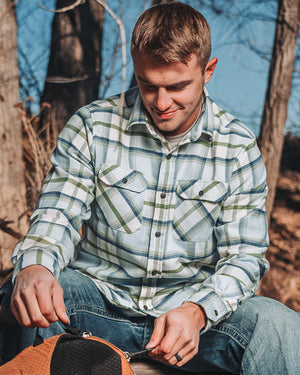
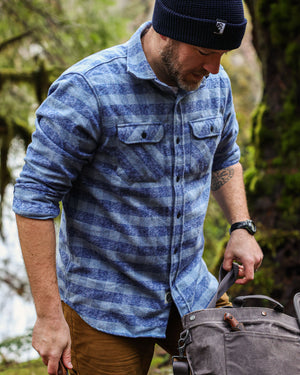
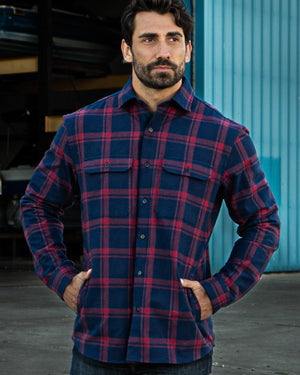
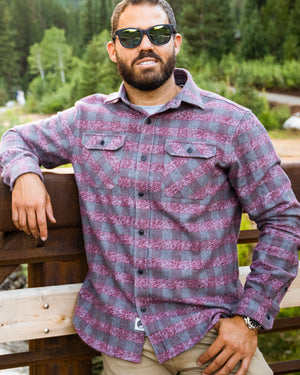
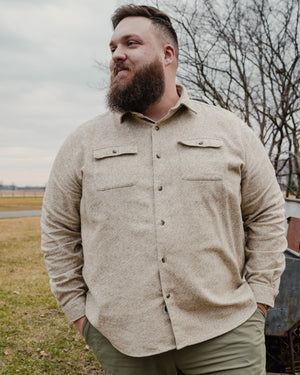
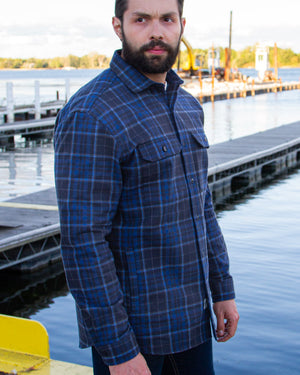
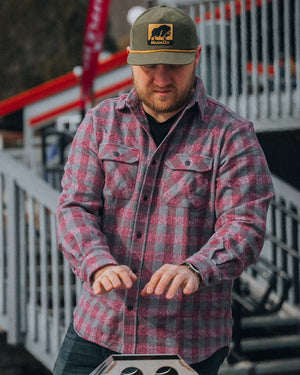

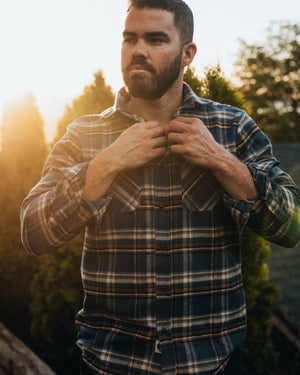
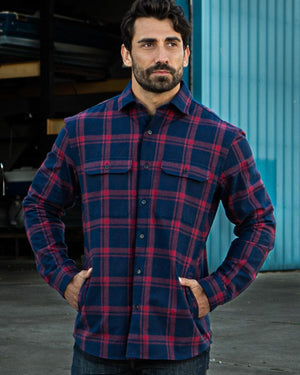
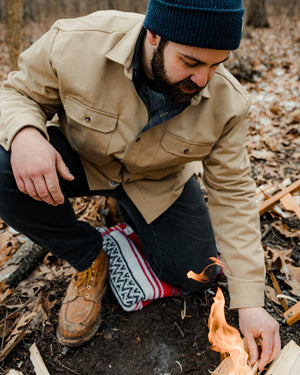
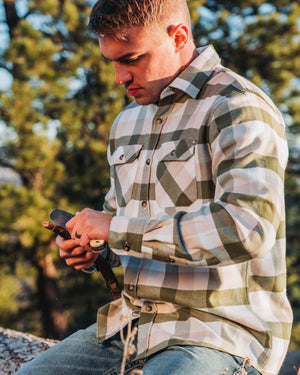
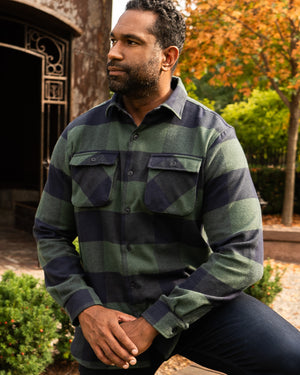


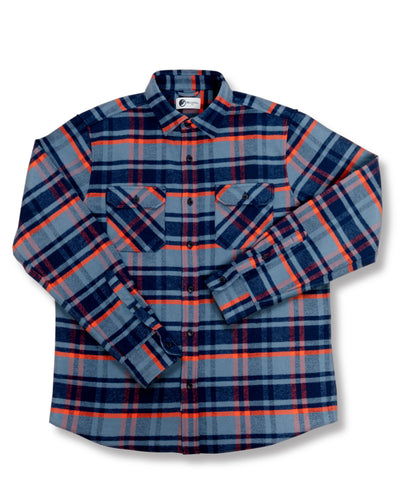

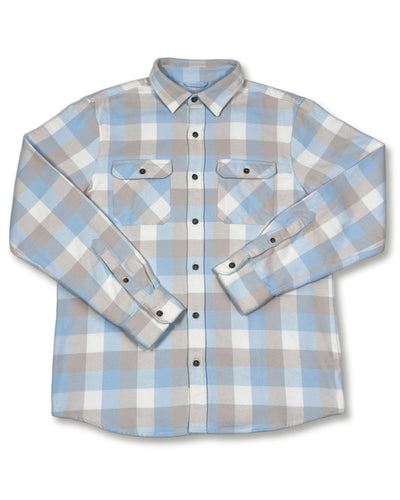
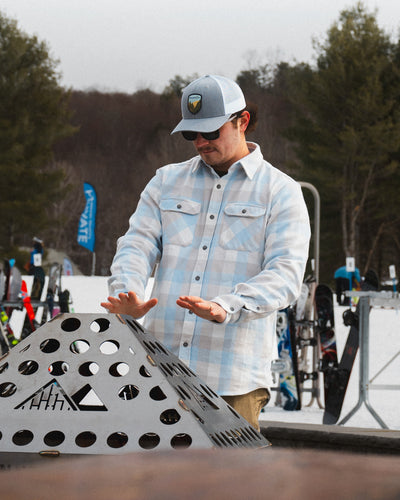
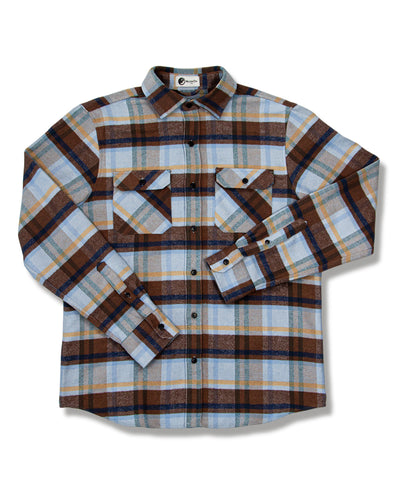
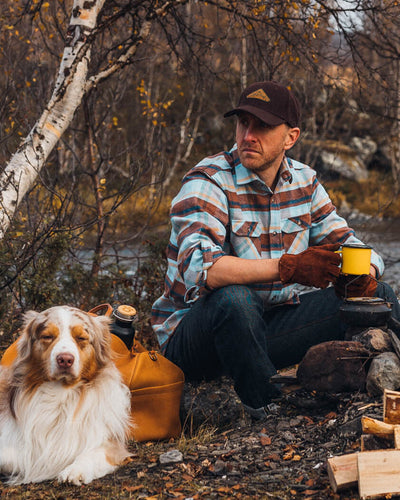
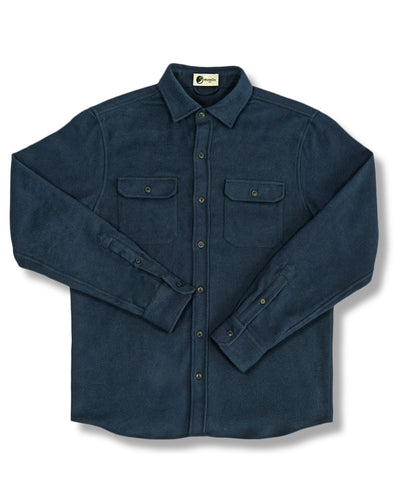
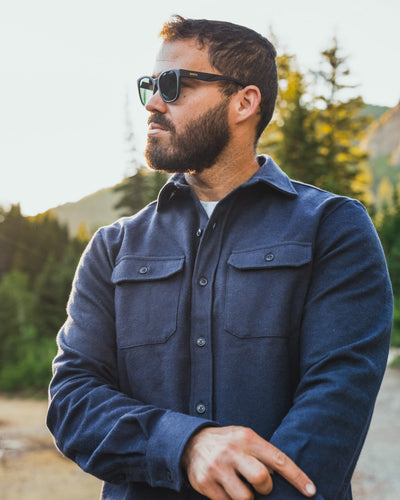



Leave a comment